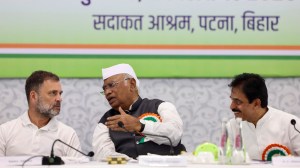In Chicago, more talk about race after speech
In the lobby of the Trinity United Church of Christ on the South Side here, a receptionist struggled to keep his head...

In the lobby of the Trinity United Church of Christ on the South Side here, a receptionist struggled to keep his head above the tidal wave of calls that poured in just after Senator Barack Obama finished speaking to the nation about race and his complicated relationship with Trinity’s former pastor, the Rev Jeremiah A Wright Jr.
Every caller seemed to want to talk about Obama’s speech, in which he condemned some of the pastor’s more controversial statements while still considering him family. But there was no time. The church was working on its official point of view, announced later in the day: “Trinity United Church of Christ supports our Christian brothers, Pastor Wright and Senator Obama,” said a spokeswoman, Linda Thomas, a professor of theology and anthropology at the Lutheran School of Theology at Chicago. “We’re proud of them both.”
In interviews in Obama’s neighborhood and around Trinity on Tuesday, the prevailing sentiment was similar: It is time for this conversation on race; it will not be pleasant; and even the most incendiary points of view deserve to be heard.
There was also much support for the pastor. Some said they were pleased that Obama did not completely denounce Wright, a fiery minister who has characterised the United States as systemically oppressive to minorities and the Government as murderous and corrupt.
“How does he denounce somebody who brought him to his faith?” asked Kali Evans-Raoul, the president of an image consulting firm. “This is a man who baptised him. Knowing Jeremiah Wright, you can’t denounce a man like that. He’s too incredible an individual. I’m a member of the same church. I know Rev. He’s a family friend. I call him when I’m in trouble. There’s no less racist church in Chicago.”
Manny Koop, a barber working just west of the downtown Loop, credited Obama as taking a political risk. Koop watched the speech while he cut hair. “It’s touchy stuff, it’s barbershop stuff,” he said. “A lot of people don’t want to address that kind of thing on national television, but he did and he did it well.”
Tamara Gathright Fritz, a researcher and psychologist having coffee in Hyde Park near the University of Chicago, said the speech could be a moment of truth for the country — or at least for Obama’s supporters.
“I think that there are people who are happy to do what is politically correct until they are actually asked to examine the self, to reach deep down and understand, ‘How have I benefited from a system of oppression?’” Fritz said. “Unfortunately, many people are positioned in this country so they don’t have to have that conversation. This candidacy forces the issue, only if people take his candidacy seriously. If they believe he can be the President of this country, maybe the pain will be worth the gain.
“But if they’re not truly committed to his candidacy, they’ll bail out on him,” she said. “This may be the excuse many people need.”
In comments posted on the website of The New York Times on Tuesday, some writers said they were moved to tears by the speech, and others thanked Obama for not speaking down to them in discussing one of the nation’s most intractable problems.
Others, though, saw the speech as more reason to support Obama’s rival, Senator Hillary Rodham Clinton, or the presumed Republican nominee, Senator John McCain.
Photos


- 01
- 02
- 03
- 04
- 05





























